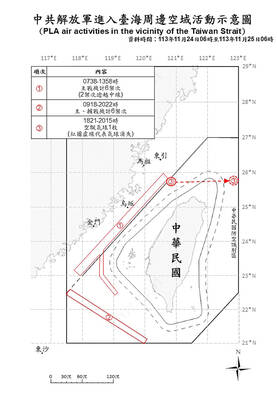The Taiwan navy's plan to acquire eight conventional submarines from the US, a deal guaranteed by US President George W. Bush, could founder because of budget problems, Jane's Defence Weekly reported.
"The desire of Taiwan for a fleet of eight diesel-electric submarines could be more than a decade away after Taiwanese navy officials told their US counterparts that funding is three years away," the weekly said.
The US has not built conventional submarines for more than 40 years and designing an entirely new one would be prohibitively expensive without foreign participation, Jane's said.
It had been hoped that the first submarines could join the Taiwanese navy in 2010 at the earliest.
But a US naval official told the weekly that if money is not available until fiscal year 2006, the process of tendering and selection would push the program to a 2013 to 2014 delivery date.
The US navy would also be looking for US$300 million to US$350 million up front to start the program, but Taiwanese legislators may baulk at the amount without knowing what kind of submarine they are receiving, the weekly said.
"US naval officials note that until Taiwan provides the US with formal assurances that sufficient funds for the multi-billion-dollar deal have been secured, any US military program to design the boats will be left in limbo," the weekly says.
Bush in April 2001 approved the sale of eight conventional submarines to Taiwan as part of Washington's most comprehensive arms package to the nation since 1992.
In related news, the first batch of AIM-120 advanced medium-range air-to-air missiles (AMRAAM) that the US agreed in 2000 to sell to Taiwan is scheduled to be delivered in the near future, military sources told reporters yesterday.
The US government has recently agreed to allow the Taiwan order -- some 200 AIM-120 missiles -- to be delivered in a bid to beef up Taiwan's defensive capabilities in the face of heightening military threats from across the Taiwan Strait, the sources said.
If everything goes smoothly, the Taiwan Air Force is expected to receive the long-awaited US-made AIM-120 missiles in one to two months as shipping, transportation and related affairs are already being arranged, the sources said.
The AIM-120 missiles are expected to be installed on F-16 jet fighters -- which form the backbone of the Taiwan air force -- once they are delivered and test fired, which is scheduled to begin early next year, the sources said.
Taiwan Air Force fighter pilots have been in the US for training, which includes flying practice and firing AIM-120 missiles at various targets.
The AIM-120 AMRAAM is a new generation air-to-air missile.
The guided missile has an all-weather, beyond-visual-range capability and active radio frequency target detection.
A follow-up to the AIM-7 Sparrow missile series, the AMRAAM is compatible with the US F-15, F-16 and developmental F-22, as well as the German F-4 and the British Sea Harrier aircraft.
The missile is faster, smaller and lighter and has improved capabilities against low-altitude targets.
It incorporates an active radar with an inertial reference unit and micro-computer system.
Once the missile closes in on a target, its active radar guides it to intercept, according to the military sources.

Taiwan’s passport ranked 34th in the world, with access to 141 visa-free destinations, according to the latest update to the Henley Passport Index released today. The index put together by Henley & Partners ranks 199 passports globally based on the number of destinations holders can access without a visa out of 227, and is updated monthly. The 141 visa-free destinations for Taiwanese passport holders are a slight decrease from last year, when holders had access to 145 destinations. Botswana and Columbia are among the countries that have recently ended visa-free status for Taiwanese after “bowing to pressure from the Chinese government,” the Ministry

Theaters and institutions in Taiwan have received 28 threatening e-mails, including bomb threats, since a documentary critical of China began being screened across the nation last month, the National Security Bureau said yesterday. The actions are part of China’s attempts to undermine Taiwan’s sovereignty, it said. State Organs (國有器官) documents allegations that Chinese government officials engage in organ harvesting and other illegal activities. From last month to Friday last week, 28 incidents have been reported of theaters or institutions receiving threats, including bomb and shooting threats, if they did not stop showing the documentary, the bureau said. Although the threats were not carried out,

HEALTHCARE: Following a 2022 Constitutional Court ruling, Taiwanese traveling overseas for six months would no longer be able to suspend their insurance Measures allowing people to suspend National Health Insurance (NHI) services if they plan to leave the country for six months would be abolished starting Dec. 23, NHIA Director-General Shih Chung-liang (石崇良) said yesterday. The decision followed the Constitutional Court’s ruling in 2022 that the regulation was unconstitutional and that it would invalidate the regulation automatically unless the NHIA amended it to conform with the Constitution. The agency would amend the regulations to remove the articles and sections that allow the suspension of NHI services, and also introduce provisional clauses for those who suspended their NHI services before Dec. 23, Shih said. According to

‘GRAY ZONE’ TACTICS: China continues to build up its military capacity while regularly deploying jets and warships around Taiwan, with the latest balloon spotted on Sunday The US is drawing up contingency plans for military deployments in Japan and the Philippines in case of a Taiwan emergency, Japan’s Kyodo news agency reported. They would be incorporated in a first joint operation plan to be formulated in December, Kyodo reported late on Sunday, citing sources familiar with Japan-US relations. A US Marine Corps regiment that possesses High Mobility Artillery Rocket Systems — a light multiple rocket launcher — would be deployed along the Nansei Island chain stretching from Kyushu to Yonaguni near Taiwan, Kyodo said. According to US military guidelines for dispatching marines in small formations to several locations,